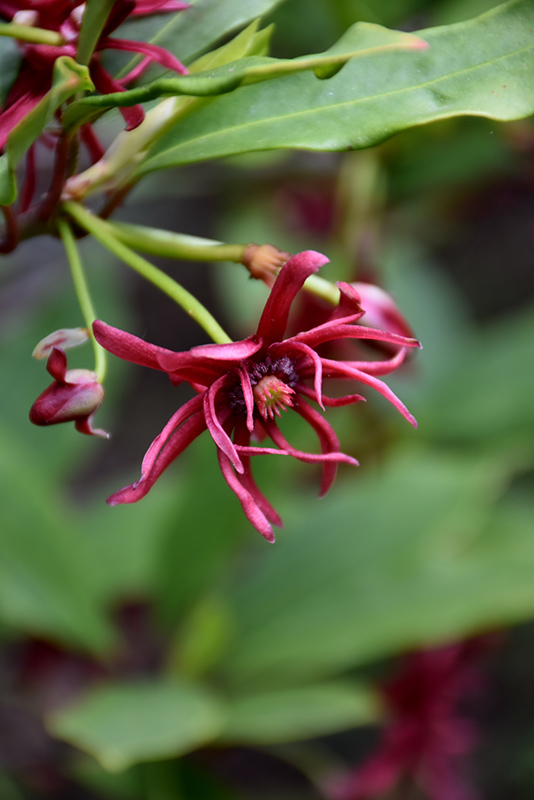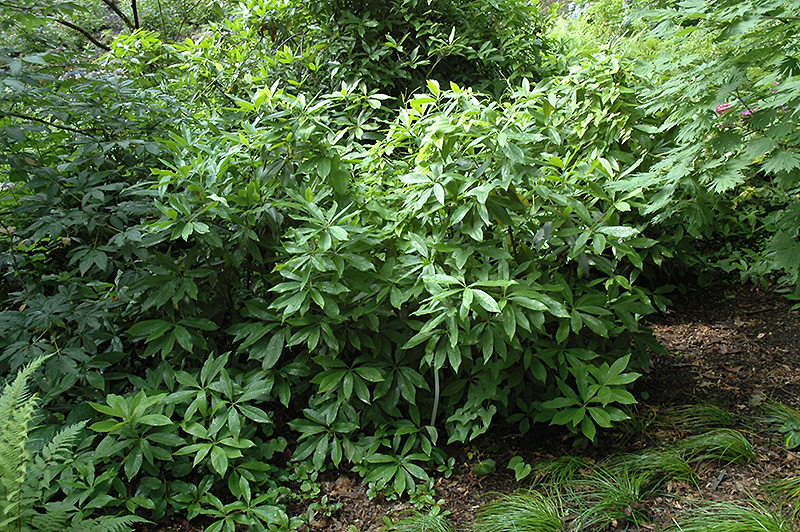Height: 9 feet
Spread: 6 feet
Sunlight:
![]()
![]()
Hardiness Zone: 6b
Description:
Glossy evergreen foliage smells like anise when crushed; produces star-shaped seeds similar to the culinary anise, but toxic; dangling, frilly red flowers; makes a fine hedge or can be limbed up as a small tree; adapts to full sun with adequate moisture
Ornamental Features
Florida Anise Tree features solitary nodding semi-double red frilly flowers rising above the foliage in mid spring. It has attractive green evergreen foliage. The fragrant narrow leaves are highly ornamental and remain green throughout the winter. It produces brown capsules in mid summer.
Landscape Attributes
Florida Anise Tree is a dense multi-stemmed evergreen shrub with an upright spreading habit of growth. Its average texture blends into the landscape, but can be balanced by one or two finer or coarser trees or shrubs for an effective composition.
This is a relatively low maintenance shrub, and is best pruned in late winter once the threat of extreme cold has passed. It is a good choice for attracting birds to your yard, but is not particularly attractive to deer who tend to leave it alone in favor of tastier treats. It has no significant negative characteristics.
Florida Anise Tree is recommended for the following landscape applications;
- Mass Planting
- Hedges/Screening
- General Garden Use
- Naturalizing And Woodland Gardens
Planting & Growing
Florida Anise Tree will grow to be about 9 feet tall at maturity, with a spread of 6 feet. It tends to fill out right to the ground and therefore doesn't necessarily require facer plants in front, and is suitable for planting under power lines. It grows at a medium rate, and under ideal conditions can be expected to live for approximately 20 years.
This shrub does best in partial shade to full shade. Keep it well away from hot, dry locations that receive direct afternoon sun or which get reflected sunlight, such as against the south side of a white wall. It prefers to grow in average to moist conditions, and shouldn't be allowed to dry out. It may require supplemental watering during periods of drought or extended heat. It is particular about its soil conditions, with a strong preference for sandy, acidic soils. It is somewhat tolerant of urban pollution. Consider applying a thick mulch around the root zone over the growing season to conserve soil moisture. This species is native to parts of North America, and parts of it are known to be toxic to humans and animals, so care should be exercised in planting it around children and pets.
Disclaimer - This Plant Finder tool is an online resource representing many of the varieties that we carry over the course of the season, and is intended for informational purposes only. Inventory varies seasonally, so we cannot guarantee that every plant will be in stock at all times - please contact the store directly for current availability. It does not include our entire selection of plants, so be sure to visit our store to see varieties that may not be represented on this list.


